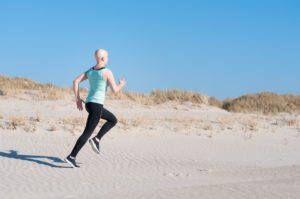Stress Management
Understanding the Human Microbiome
Exploration of the human microbiome is leading to revolutionary changes in health, wellness and disease management.
Physical Activity Can Reduce Burnout
Burnout is an issue in the modern world, with annual costs to society estimated at more than $136 billion. Physical activity can reduce the risk of burnout, defined as a severe and persistent form of fatigue that occurs after a long period of work stress.
Options that reduce professional burnout are good news for employers. Fitness pros who want to promote corporate wellness can share the following study with business owners to highlight the benefits of onsite fitness programs.
Corporate Fitness Evolves
Employers are looking for partners to provide experiences and solutions in social, emotional, financial, family and career growth and well-being,” says Grace DeSimone, national group fitness director with Plus One Health Management, an Optum company, in New York City. Companies are also embracing mindfulness, meditation and virtual solutions for telecommuting employees, according to DeSimone. All these changes represent an evolution from programs aimed primarily at improving physical health and controlling healthcare costs.
NEAT Exercise for the Brain
Have you heard that prolonged sitting can be as bad for health as smoking (Owen, Bauman & Brown 2008)? The good news is that movement can help, and it doesn’t have to be a marathon. One avenue worth exploring is nonexercise activity thermogenesis (NEAT). NEAT encompasses the calories burned while living life: walking to work, fidgeting, typing, folding clothes, washing dishes, running errands and so on; only sleeping, eating and sports are not included (Levine & Yeager 2009).
Exercise Doesn’t Have To Be Strenuous To Be Effective
We know that replacing sedentary behavior with physical activity yields numerous benefits. And while high-intensity models are touted as a way to fast-track success, a new study out of Sweden says it’s not necessary to go all-out in order to boost health.
Learn, Connect and Thrive at the IDEA® World Convention
Education is the foundation of the IDEA World Convention, but this fitness event offers plenty more than stellar instruction. For Jonathan Bernath, publicist-turned-personal-trainer, it’s where he discovered the “fitness family” that would guide him in his new career.
Green Exercise: How It Benefits You
Here’s a look at what the latest findings tell us about why you may want to incorporate green exercise into your programs.
Exercise’s Impact on Cancer
There are three ways to look at battling cancer. For those who don’t have it, lowering risk is the primary goal. For those who’ve had it, successfully recovering and, of course, reducing the chances of recurrence are of utmost importance. For those who currently have it, the priorities are getting rid of it and minimizing the harmful effects that both the disease and the treatment have on the body. Exercise has been shown to help with all three.
How to Develop Better Work–Life Balance
Do you find yourself checking your email and responding to messages well after you’ve “clocked out” for the day? While keeping up with emails after hours might seem productive, researchers from the University of Zurich in Switzerland believe this habit could have the opposite effect.
They launched an online survey in which 1,916 employees answered questions about work–life balance. For example, respondents were asked how often they thought about work during nonwork hours; the type and frequency of recovery activities; and exhaustion levels.
New Review Determines Weight Management Tool
Mindfulness practices such as meditation and conscious eating techniques may offer secrets to losing weight and keeping it off, say researchers from Montreal’s McGill University.
Noting some inconsistencies in prior findings, the researchers undertook a comprehensive analysis of 19 mindfulness and lifestyle modification studies that included 1,160 subjects. Here’s some of what the scientists learned from their investigation:
All Types of Exercise Prevent Depression
Regular exercise of any intensity for as little as 1 hour per week can prevent depression in people of all ages and genders, according to findings by an international research team led by the Black Dog Institute in Randwick, Australia. The study monitored exercise levels and symptoms of anxiety and depression in 33,908 Norwegian adults for more than 11 years.
Cultivate Joy Through Mindfulness
It’s a busy, technology-dominated world—and most of us are continually spinning, twisting and turning in an effort to “get things done” and “produce.” We work, we raise families, we have countless responsibilities. The truth is, this is distracted living, and it raises stress levels, lowers productivity and interferes with our ability to focus. When we live this way, we fail to cultivate a sense of contentment and joy.
Cultivating a Home Yoga Practice
Find out why a home yoga practice can benefit your students, how to encourage them to create the space, and what will help them sustain it.
Mindfulness, Stress and Blood-Sugar Regulation
A Penn State University study found that women with overweight or obesity had significantly lower levels of stress and fasting glucose after participating in a mindfulness-based stress reduction [MBSR] program. Researchers evaluated the effects of MBSR on cardiometabolic outcomes in 86 women with overweight or obesity. The 8-week MBSR program—which consists of group training in mindfulness, stress reduction, mindful movement and meditation—includes weekly 2.5-hour sessions, one 6-hour retreat and a recommendation of daily home practice.
The Science of Yoga
“Jane,” like many clients, tried yoga to reduce her stress and anxiety, but she often held her breath during triggering moments, taxing her to the point where she’d feel faint and need to lie on the floor. After taking yoga sessions with Nicole DeAvilla, RYT 500, of Kentfield, California, Jane immediately felt calmer, more grounded and more optimistic.
Happiness Is Found on the Hiking Trail
The next time someone tells you to take a hike, why not heed the suggestion! A new report says outdoor mountain hiking has many significant benefits.
Mindful Movement, Meditation and High Blood Pressure
Qigong, yoga and tai chi may all be useful practices for reducing high blood pressure. And qigong, in particular, may have the most significant impact on reducing diastolic blood pressure [DBP], according to a review of studies published in Evidence-Based Complementary and Alternative Medicine (2017; article ID 9784271).
Cycling to Work Could Ease Workday Stress
A new study from Concordia University in Montreal finds that people who commute to work on a bike arrive at the office less stressed.
Control Your Moods, Achieve Your Goals
Anxious, fatigued, unhappy, uncertain? We’ve all been there, all known times when our emotional hot buttons take over. We swear to ourselves that this time we will overcome them and stay committed to our goal, but it doesn’t work and we react with indulgent self-gratification. “I had such a long day, and I just don’t feel like going to the gym today.” “I’ve already fallen off the wagon so I’ll just eat what I want and start again on Monday.”
Mindful or Mind Full?
It’s a busy, technology-dominated world—and most of us are continually spinning, twisting and turning in an effort to “get things done” and “produce.” We work, we raise families, we have countless responsibilities. The truth is, this is distracted living, and it raises stress levels, lowers productivity, interferes with our ability to focus and compromises the mind-body connection. When we live this way, we fail to cultivate a sense of contentment and joy, which is counterproductive to our work as fitness and wellness professionals.



















